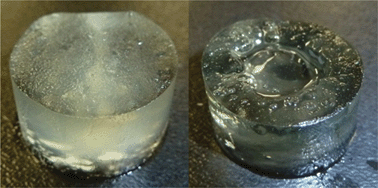The consumption of excess saturated fat is known to increase the risk of obesity and cardiovascular disease. With this in mind, the food industry has been attempting to reduce the content of saturated and trans-fats in food products. In theory this could be achieved by replacing saturated fats, such as butter and hydrogenated oils, with unsaturated fats like vegetable oils. However, in practice, the physical characteristics of the food are altered and have less desirable qualities. Therefore, it is a challenge for scientists to reduce the saturated fat content of foods while maintaining the textural and mechanical properties such as mouth-feel, creaminess and firmness.
 In this work, Alejandro Marangoni and co-workers from Guelph, Canada, have investigated the use of ethylcellulose (EC) oleogels for this purpose. Oleogels are very versatile and their mechanical properties can be tailored by altering the fatty acid profile of the oil component, or changing the viscosity or concentration of the polymer component. The team discovered that certain formulations of EC oleogels tend to separate into two distinct phases consisting of a soft interior core surrounded by a firm exterior sheath. The formation of the two distinct regions is highly dependent on the temperature gradient within the gel during setting. The results offer an alternative route to achieving a varying texture in an otherwise homogeneous gel.
In this work, Alejandro Marangoni and co-workers from Guelph, Canada, have investigated the use of ethylcellulose (EC) oleogels for this purpose. Oleogels are very versatile and their mechanical properties can be tailored by altering the fatty acid profile of the oil component, or changing the viscosity or concentration of the polymer component. The team discovered that certain formulations of EC oleogels tend to separate into two distinct phases consisting of a soft interior core surrounded by a firm exterior sheath. The formation of the two distinct regions is highly dependent on the temperature gradient within the gel during setting. The results offer an alternative route to achieving a varying texture in an otherwise homogeneous gel.
Read this article for free until the 11th January 2013!
Fractionation of ethylcellulose oleogels during setting, Andrew J. Gravelle, Shai Barbut and Alejandro G. Marangoni, Food Funct., 2013, DOI: 10.1039/c2fo30227f
You can keep up to date with the latest developments from Food & Function by signing up for free table of contents alerts and monthly e-newsletters.










